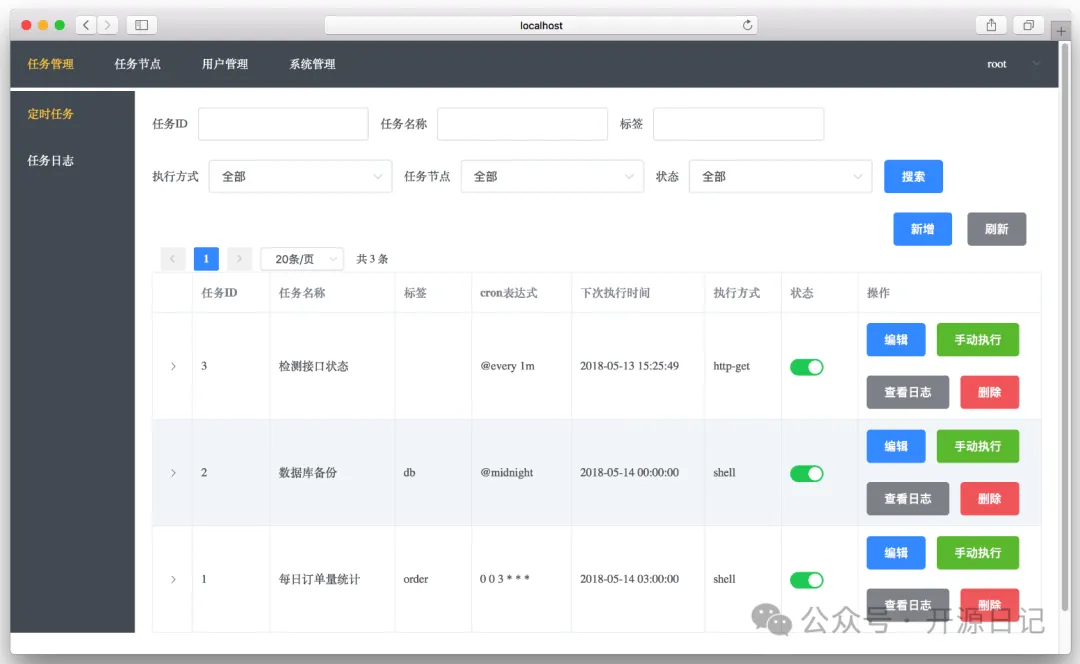自己写了一个Python小工具:xshell2mobaxterm,可以将xshell的session转换成mobaxterm的数据文件以导入到mobaxterm中。
exe版的编译好了,博客园不支持附件,所以没法上传,需要的话可以评论留下邮箱,我发送给你。
Python代码:
#!/usr/bin/env python3
# -*- coding: utf-8 -*-
# xshell session to mobaxterm session file
# Support: TELNET, serial, SSH
# Usage: xshell2mobaxterm.py Xshell_Session_Direcotry
# Example: python3 xshell2mobaxterm.py D:\\Xshell\\Session >mobaxterm.mxtsessions
# Linux platform enviroment: LANG=zh_CN.utf8/en_US.utf8
# Windows: python3.6 cmd run it.
import os, sys
def convert_x2m(xshell_session_file, num):
#print(xshell_session_file)
ssh_format = (
\'[{BookMarks}]\\n\'
\'SubRep={Directory}\\n\'
\'ImgNum=41\\n\'
\'{SessionName} ({UserName})=#109#0%{Host}%{Port}%{UserName}%%-1%-1%%%%%0%0%0%%%-1%0%0%0%%1080%%0%0%1#DejaVu Sans Mono%{FontSize}%0%0%-1%15%236,236,236%30,30,30%180,180,192%0%-1%0%%xterm%-1%-1%_Std_Colors_0_%80%24%0%1%-1%<none>%%0%1%-1#0# #-1\\n\'
)
telnet_format = (
\'[{BookMarks}]\\n\'
\'SubRep={Directory}\\n\'
\'ImgNum=41\\n\'
\'{SessionName} ()= #98#1%{Host}%{Port}%%%2%%%%%0%0%%1080%#DejaVu Sans Mono%{FontSize}%0%0%-1%15%236,236,236%30,30,30%180,180,192%0%-1%0%%xterm%-1%-1%_Std_Colors_0_%80%24%0%1%-1%<none>%%0%1%-1#0# #-1\\n\'
)
serial_format = (
\'[{BookMarks}]\\n\'
\'SubRep={Directory}\\n\'
\'ImgNum=42\\n\'
\'{SessionName}= #131#8%-2%100{Speed}%3%0%0%1%2%{Port}#DejaVu Sans Mono%{FontSize}%0%0%-1%15%236,236,236%30,30,30%180,180,192%0%-1%0%%xterm%-1%-1%_Std_Colors_0_%80%24%0%1%-1%<none>%%0%1%-1#0# #-1\\n\'
)
session_file = open(xshell_session_file, \'r\')
session_lines = session_file.readlines()
xshell_attr = {\'num\': num}
xshell_attr[\'Directory\'] = os.path.dirname(xshell_session_file.replace(sys.argv[1], \'\').strip(\'\\\\\'))
xshell_attr[\'SessionName\'] = os.path.basename(xshell_session_file).rsplit(\'.\',1)[0]
if num == 0:
xshell_attr[\'BookMarks\'] = \'Bookmarks\'
else:
xshell_attr[\'BookMarks\'] = \'Bookmarks_{num}\'.format(num=num)
for line in session_lines:
if line.startswith(\'UserName=\'):
xshell_attr[\'UserName\'] = line.split(\'=\')[1].strip(\'\\n\')
elif line.startswith(\'Port=\'):
xshell_attr[\'Port\'] = line.split(\'=\')[1].strip(\'\\n\')
elif line.startswith(\'FontSize=\'):
xshell_attr[\'FontSize\'] = line.split(\'=\')[1].strip(\'\\n\')
elif line.startswith(\'Host=\'):
xshell_attr[\'Host\'] = line.split(\'=\')[1].strip(\'\\n\')
elif line.startswith(\'Protocol=\'):
xshell_attr[\'Protocol\'] = line.split(\'=\')[1].strip(\'\\n\')
elif line.startswith(\'BaudRate=\'):
xshell_attr[\'Speed\'] = line.split(\'=\')[1].strip(\'\\n\')
#print(xshell_attr)
x = 1
if xshell_attr.get(\'Protocol\').lower().startswith(\'ssh\'):
x = ssh_format.format(
Directory = xshell_attr.get(\'Directory\') or \'\',
SessionName = xshell_attr.get(\'SessionName\') or \'default\',
UserName = xshell_attr.get(\'UserName\') or \'\',
Port = xshell_attr.get(\'Port\') or \'22\',
FontSize = xshell_attr.get(\'FontSize\') or \'12\',
num=xshell_attr[\'num\'],
Host=xshell_attr.get(\'Host\') or \'\',
BookMarks=xshell_attr[\'BookMarks\']
)
elif xshell_attr.get(\'Protocol\').lower() == \'telnet\':
x = telnet_format.format(
Directory = xshell_attr.get(\'Directory\') or \'\',
SessionName = xshell_attr.get(\'SessionName\') or \'default\',
UserName = xshell_attr.get(\'UserName\') or \'\',
FontSize = xshell_attr.get(\'FontSize\') or \'12\',
Port = xshell_attr.get(\'Port\') or \'23\',
num=xshell_attr[\'num\'],
Host=xshell_attr.get(\'Host\') or \'\',
BookMarks=xshell_attr[\'BookMarks\']
)
elif xshell_attr.get(\'Protocol\').lower() == \'serial\':
x = serial_format.format(
Directory = xshell_attr.get(\'Directory\') or \'\',
SessionName = xshell_attr.get(\'SessionName\') or \'default\',
FontSize = xshell_attr.get(\'FontSize\') or \'12\',
Port = xshell_attr.get(\'Port\') or \'\',
Speed = xshell_attr.get(\'Speed\') or \'9600\',
num = xshell_attr[\'num\'],
BookMarks = xshell_attr[\'BookMarks\']
)
#print(x.replace(\'/\', \'\\\\\'))
return x.replace(\'/\', \'\\\\\')
def generate_mobaxterm_sessions(xshell_session_path, count):
#print(session_path)
base_dir = os.listdir(xshell_session_path)
for file in base_dir:
file = os.path.join(xshell_session_path, file)
try:
os.listdir(file)
#print(file)
generate_mobaxterm_sessions(file, count)
except:
if not file.endswith(\'.xsh\'): continue
print(convert_x2m(file, count[0]))
count[0] += 1
if __name__ == \'__main__\':
count = [0]
generate_mobaxterm_sessions(sys.argv[1], count)
使用方法:
(1)cmd>python3 Python代码文件 \”Xshell Session所在的路径\” >mobaxterm.mxtsessions
例如:C:\\Users\\user>python3 xshell2moba.py \”C:\\Users\\user\\Documents\\NetSarang\\Xshell\\Sessions\” > mobaxterm.mxtsessions
会在cmd的当前目录(C:\\Users\\user\\)中生成一个mobaxterm.mxtsessions文件
备注:如果不知道Xshell Session的路径,可以在xshell本地命令行中输入pwd命令查看:

(32)将生成的mobaxterm.mxtsessions文件导入mobaxterm即可。
© 版权声明
THE END










暂无评论内容